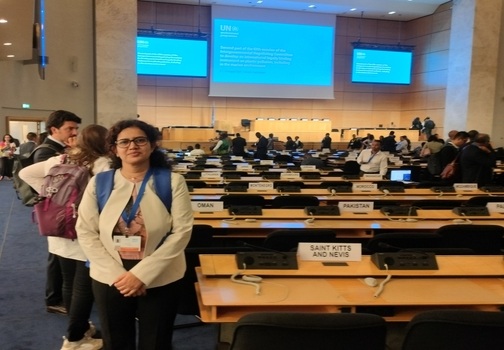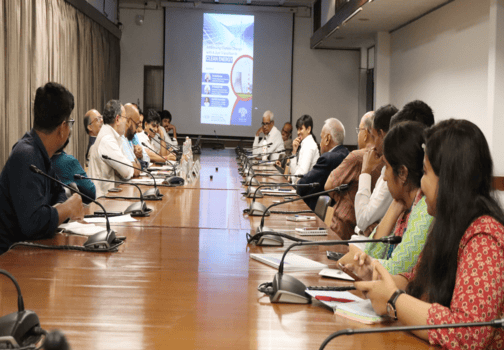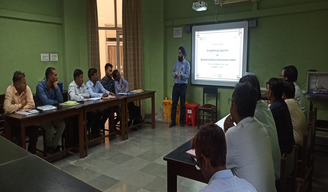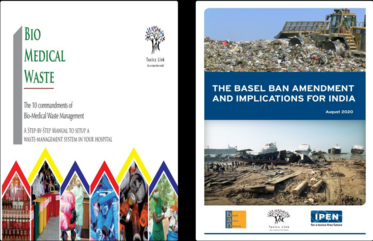TECHNOLOGIES TO TREAT ARSENIC-LADEN WATER
GOVERNMENT OF INDIA
MINISTRY OF JAL SHAKTI
DEPARTMENT OF WATER RESOURCES, RIVER DEVELOPMENT & GANGA
REJUVENATION
RAJYA SABHA
STARRED QUESTION NO. *116
ANSWERED ON 31.07.2023
TECHNOLOGIES TO TREAT ARSENIC-LADEN WATER
*116 SHRI RYAGA KRISHNAIAH
Will the Minister of JAL SHAKTI be pleased to state:
(a) the share of research funds being allocated to find a suitable solution to develop Technologies to treat arsenic-laden water;
(b) the steps taken by Government to provide proper medical care to arsenic-affected people to reduce the effects of poisoning;
(c) whether it is a fact that the majority of people affected by arsenic contamination in the country live in rural areas and are not aware of the poisoning and possible treatment procedures; and
(d) if so, the steps taken by Government to increase awareness for the same?
ANSWER
THE MINISTER OF JAL SHAKTI (SHRI GAJENDRA SINGH SHEKHAWAT)
(a) to (d) : A statement is laid on the Table of the House.
STATEMENT REFERRED TO IN REPLY TO PARTS (a) TO (d) OF STARRED QUESTION
No. *116 TO BE ANSWERED IN RAJYA SABHA ON 31.07.2023 REGARDING
“TECHNOLOGIES TO TREAT ARSENIC-LADEN WATER”.
(a) The research studies are being funded under the scheme “Research and Development Programme in
Water Sector and Implementation of National Water Mission” of Ministry of Jal Shakti. Also, there is a provision of funding water related research activities under Jal Jeevan Mission. In addition, Department of Science and Technology (DST) has been providing funds for arsenic removal and mitigation technology projects. Details of research activities related to development of technology to treat arsenic laden water, innovative technique to construct arsenic free wells, remedial measures, etc., are enclosed as Annexure.
(b) In order to provide relief to people affected by the excess arsenic in water and prevent further exposure, technical guidelines for “Detection, Prevention and Management of Arsenicosis in India” have been prepared by Ministry of Health & Family Welfare and shared with the affected States for use by the health authorities and programme managers. These are also to be used for training of field functionaries such as medical officers, paramedical workers, etc. The guidelines are available on the websites of Directorate General of Health Services and Ministry of Health & Family Welfare.
(c) & (d) Government of India is implementing Jal Jeevan Mission (JJM) – Har Ghar Jal, since August, 2019, in partnership with States, to make provision of potable tap water supply in adequate quantity, of prescribed quality and on regular & long-term basis to every rural household. Under JJM, while allocating the funds to States/ UTs, 10% weightage is given to the population residing in rural habitations affected by chemical contaminants including arsenic-affected habitations. Under JJM, while planning for potable water supply to household through tap water connection, priority is to be given to quality-affected habitations. Since, planning, implementation and commissioning of piped water supply scheme based on a safe water source may take time, purely as an interim measure, States/ UTs have been advised to install community water purification plants (CWPPs) especially in arsenic and fluoride affected habitations to provide potable water to every household at the rate of 8–10 litre per capita per day (lpcd) to meet their drinking and cooking requirements. Under JJM, contamination in drinking water sources in rural areas is monitored habitation-wise. At the start of the Mission, as on 01.04.2019, 14,020 habitations across 6 States were reported by States/UTs as arsenic affected. As reported by States, as on 25.07.2023, the number of arsenic affect habitations has reduced to 460. These are only in the States of Punjab, Uttar Pradesh and West Bengal. Provision of safe drinking water for cooking and drinking requirements has been made in all these habitations also, by respective States.
States/UTs have been advised to undertake testing of water quality on a periodic basis, i.e., once in year for chemical and physical parameters, and twice in a year for bacteriological parameters and take remedial action wherever necessary, to ensure that the water supplied to households is of prescribed quality. To enable States/UTs to test water samples for water quality, and for sample collection, reporting, monitoring and surveillance of drinking water sources, an online JJM – Water Quality Management Information System (WQMIS) portal has been developed. As reported by States/UTs on WQMIS, more than 62.81 lakh water samples have been tested in the water testing laboratories and 107.92 lakh water samples using Field Testing Kits, during 2022-23. During 2023-24, as on 28.07.2023, more than 21.81 lakh water samples have been tested in the water testing laboratories and 29.88 lakh water samples using Field Testing Kits. The State–wise details of water quality test reported through WQMIS are available in public domain on JJM Dashboard and can also be accessed at:
https://ejalshakti.gov.in/WQMIS/Main/report
As reported by States/UTs, as on date, there are 2,087 drinking water quality testing laboratories at different levels viz. State, District, sub-division and/ or block level in the country. To encourage water quality testing to ensure potable drinking water supply, States/ UTs have opened water quality testing laboratories to general public for testing of their water samples at a nominal rate.
States/UTs have been advised to identify and train 5 persons, preferably women from every village, to conduct water quality testing using FTKs/ bacteriological vials at village level and report the same on the WQMIS portal. So far, as reported by States/UTs, about 22.37 lakh women have been trained. Under JJM, States/ UTs can utilize up to 2% of their annual allocation of funds under JJM for Water Quality Monitoring & Surveillance (WQM&S) activities including awareness generation on water quality issues, water-borne diseases, and health impacts. Central Ground Water Board organizes various awareness programme including Public Interaction Programs (PIP) on local ground water issues, wherein the stakeholder including the local public are imparted information on various quality related issues. A total of 1,376 PIPs have been organized by CGWB, wherein about 1.22 lakh individuals have been made aware about various ground water related issues. In order to create awareness of disease symptoms and prevention of Arsenicosis, Ministry of Health & Family Welfare has also shared IEC material with the affected States.






